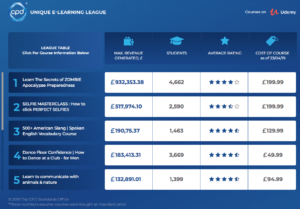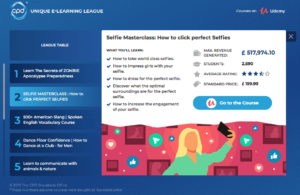 Forbes has estimated by 2025 e-learning could be worth a staggering $325 billion. With the rise in popularity and content, businesses are cashing in on the e-learning market and are becoming more creative with concepts to capture new audiences. The CPD Standards Office is a body that offers cpd accreditation in the UK and recently launched a campaign to uncover the top 10 most unusual e-learning courses on Udemy.
Forbes has estimated by 2025 e-learning could be worth a staggering $325 billion. With the rise in popularity and content, businesses are cashing in on the e-learning market and are becoming more creative with concepts to capture new audiences. The CPD Standards Office is a body that offers cpd accreditation in the UK and recently launched a campaign to uncover the top 10 most unusual e-learning courses on Udemy.
The findings showed an acceleration in demand for unique and inventive courses, from zombie apocalypse training to building a rocket. The Unique E-learning League gives an insight into how companies and entrepreneurs have profited from creatively packaging these courses.
 The table shows a variety of unique course titles, from How to Survive a Zombie Apocalyp E-learningse to Train Your Dog to Walk on a Treadmill. It also reflects the astounding $2 million in revenue generated from over 20,000 students. This study aimed to show that more people are turning to less mainstream programs and seeking niche subjects to learn about.
The table shows a variety of unique course titles, from How to Survive a Zombie Apocalyp E-learningse to Train Your Dog to Walk on a Treadmill. It also reflects the astounding $2 million in revenue generated from over 20,000 students. This study aimed to show that more people are turning to less mainstream programs and seeking niche subjects to learn about.
How can Marketing and Sales professionals use creative e-learning to drive leads into their business?
Below are 5 points on how you can use creative e-learning to tap into new audiences, build brand awareness, loyalty and generate leads.
1. Be Creative and Tell a Story
An ingenious title combined with content can go far with prospective students. A straightforward concept can be altered to appeal to a larger market. The number two course was marketed as a ‘Selfie Masterclass’, this was a photography course. Photography courses are widely available online but given this title enabled the appearance of a unique and niche program. This ensures you can remain relevant to your brand while giving a contemporary spin on the content. The key is to find a topical subject that is compatible with your business.
 This course may have been selling camera/filming equipment, perhaps promoting a new photography app. By using the term ‘selfie’ instead of ‘How to Take a Photograph of Yourself’, this attracts the attention of a new type of audience that may be in the market for your service but may not have been actively looking for it.
This course may have been selling camera/filming equipment, perhaps promoting a new photography app. By using the term ‘selfie’ instead of ‘How to Take a Photograph of Yourself’, this attracts the attention of a new type of audience that may be in the market for your service but may not have been actively looking for it.
2. Be Concise with Your Offering
Students do not want to feel they have been mis-sold. If you are pitching false outcomes from your course, this will inevitably lead to unsatisfied purchasers and negative feedback. Although we encourage you to be creative with your program, be realistic. For example, ‘How to Build a Rocket’ was ranked number 9 on the Unique E-Learning League.
Should the authors given the pretense the student would be orbiting the earth upon commencement of their learning, it would have struggled to generate the £14,000+ revenue reported. However, an eye-catching title with a clear description of the more modest outcome of small science experiments with household items (aimed primarily as a learning activity for children) leads to many of the public purchasing this course.
Bring creative (not misselling) keeps the student engaged in your course for longer, which in turn creates brand loyalty increasing the chance for them to buy into your brand.
3. Offer user support
While it may be unlikely you are able to monitor queries 24/7, make sure support is offered to those when needed. Adding the option of contact when learners need guidance reaffirms trust in the brand as it shows your business values the clients. Provide a ‘Live Chat’ feature or opportunities to post comments throughout the course, therefore the student can continue the course with the knowledge that any queries will be resolved shortly.
Another means to user support is creating forums for current and previous students. Discussions can be had, and ideas and solutions are exchanged. Problems can be addressed at a faster rate and create greater satisfaction overall. This also provides a platform for valuable feedback, whether for alteration to the current course or inspiration for a series of courses in the future.
Helping the learner throughout their journey and addressing queries gives your brand the perception of truly valuing the user. In turn, this can create a commitment to the business and lead to further purchases.
4. Offer exceptional value
Offer value for money from the course itself and through discounted products. There is endless information online, much of it free to access. You need to ensure prospective students choose your course. The public is more reluctant than ever to part with their cash, so offering an intermittent discount on the price of the program can lead to a peak in Sales and the purchasers satisfied they gained a bargain.
Towards the end of the course, once trust has been built with the user you can promote your products or services. The more value that has been provided to the student, the longer they will remain engaged. At this point, they will feel more inclined to trust you with their cash or some small commitment, such as an email address.
Offering free resources in exchange for contact information is a fantastic way of helping the student with the learning process and also gaining contact information and plugging them into a CRM. Once stored into a CRM this can be nurtured across a number of email sequences.
Use the end of the course to give the student the opportunity to commit to your brand, this could be taking them to a landing page and requesting they opt-in their contact information in exchange for further resources or perhaps taking them to a product page that relates to the course content.
5. Be user-friendly
Perhaps one of the most pinnacle elements. Students will be left unsatisfied if the course is a struggle to complete. Firstly, the visuals of the course should be user-friendly. Do not overload the user with cluttered graphics and text. Keep things simple and clean, written information should be broken down and kept clear of unnecessary content.
Making these courses mobile friendly is key, many learners will study on-the-go and not having easy accessibility will become off-putting. Be conscience of those with disabilities, consider adding subtitles to videos and audio descriptions if possible.
Keep the language consistent with the skill set you have targeted; a beginner’s course should not appear too complex and leave the user confused. Likewise, a more advanced course can briefly cover the basics but should primarily offer new information.
Having a face speaking to the camera not only gives a personal touch but also helps build trust with the student on the other side. This should help to alleviate any concerns over the course value the student may have initially had.
Summary
The course should allow you to tap into new audiences in the market for your services, but who may never have come across your brand before. The course also gives the student an opportunity to build some trust and loyalty with you before asking them to commit. It bridges the gap between a Marketing or Sales message and allows you to provide an immense amount of value whilst being more receptive to messages throughout
Creativity is key and can draw in clients that initially may not have had a general interest in your products or services. Don’t be put off by the idea of generating the content. Although it may initially take time, your content does not need to be restricted to one platform.
By using a video production agency you can ensure your content is high quality and saves you the time of editing. If this isn’t suitable to yourself, most smartphones have sufficient quality on the cameras nowadays and teamed with a tripod can do a great job, alongside signing up to Udemy free of charge.
The additional benefit is that by the time you have created all your course content, you will have gained an archive of evergreen content that can be rolled out across Social Media, Email and other Marketing channels.
Read more: How Mobile Apps Are Revolutionizing the Future of E-Learning




















